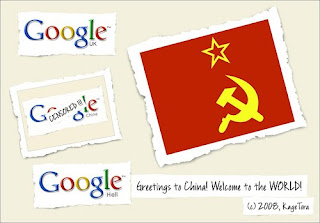Google has fired the first salvo. China has yet to respond. A war of wills has begun.
In a blog post Google claimed that China is responsible for systematic attempts to hack into confidential data stored by the internet giant. The implication is that China tried to obtain data on individual email and internet users who are considered 'dissidents' by the Chinese state.
The episode underlines the changing balance of power in today's world.
Red China was non-existent in the international economic system only a few decades ago. Today China is an economic powerhouse with several trillion US Dollars in reserves. Financial markets don't listen to statements made by the Bundesbank; it is the People's Bank of China that moves markets.
Google, the company or the word, also did not exist a few decades ago. Today, the definition of the word 'google' can be found in many respectable dictionaries. It is a part of the English language.
Like China, Google is a powerhouse in today's world. Amongst other things, Google's global market share for internet searches is estimated to be in the vicinity of 70%. Consider the amount of internet searches that take place daily.
Google is responsible for a tremendous amount of physical infrastructure. Google's servers and related equipment consume so much electricity that the company has applied for a US government license to distribute electricity. The license will allow it to more efficiently manage electricity loads among its various sites.
So, what's with the clash of the modern day Titans?
China is relatively new to the game of international commerce. The government's walks a fine line in balancing economic freedoms with social freedoms. Often the balance is found after overshooting in one direction or the other.
Google is a product of the new wave of 'jeans and t-shirt' entrepreneurship. For the management and founders, business is not only about dollars and cents. It is a way to make the world a better place.
It seems there is a complex and finely nuanced negotiation taking place between Google and China. Already incensed by being forced to censor their Chinese language search engine, Google seems to have let some pent up frustration colour its thinking (and statement).
To the Chinese state, Google represents Western values and influence which they have long controlled successfully. To Google and Western businesses in general, China represents the new Holy Grail. China is a huge consumer market where affluence is growing by leaps and bounds each year.
It is unlikely that Google will completely abandon China. Just as unlikely is China's desire to alienate the international business community by reacting hastily to Google's threat. Yes, it is a threat.
In the next few weeks, China will be forced to confront the reality of the Internet Age. Pravda and Izvestia died many years ago. This decade may see the Beijing Review breathe its last.
When Google issued shares to the investing public its founders said, "we [the founders] may do things that we believe have a positive impact on the world, even if the near-term financial returns are not obvious."
This seems to be one of those occasions. The near term financial returns are not obvious to most investors.






No comments:
Post a Comment